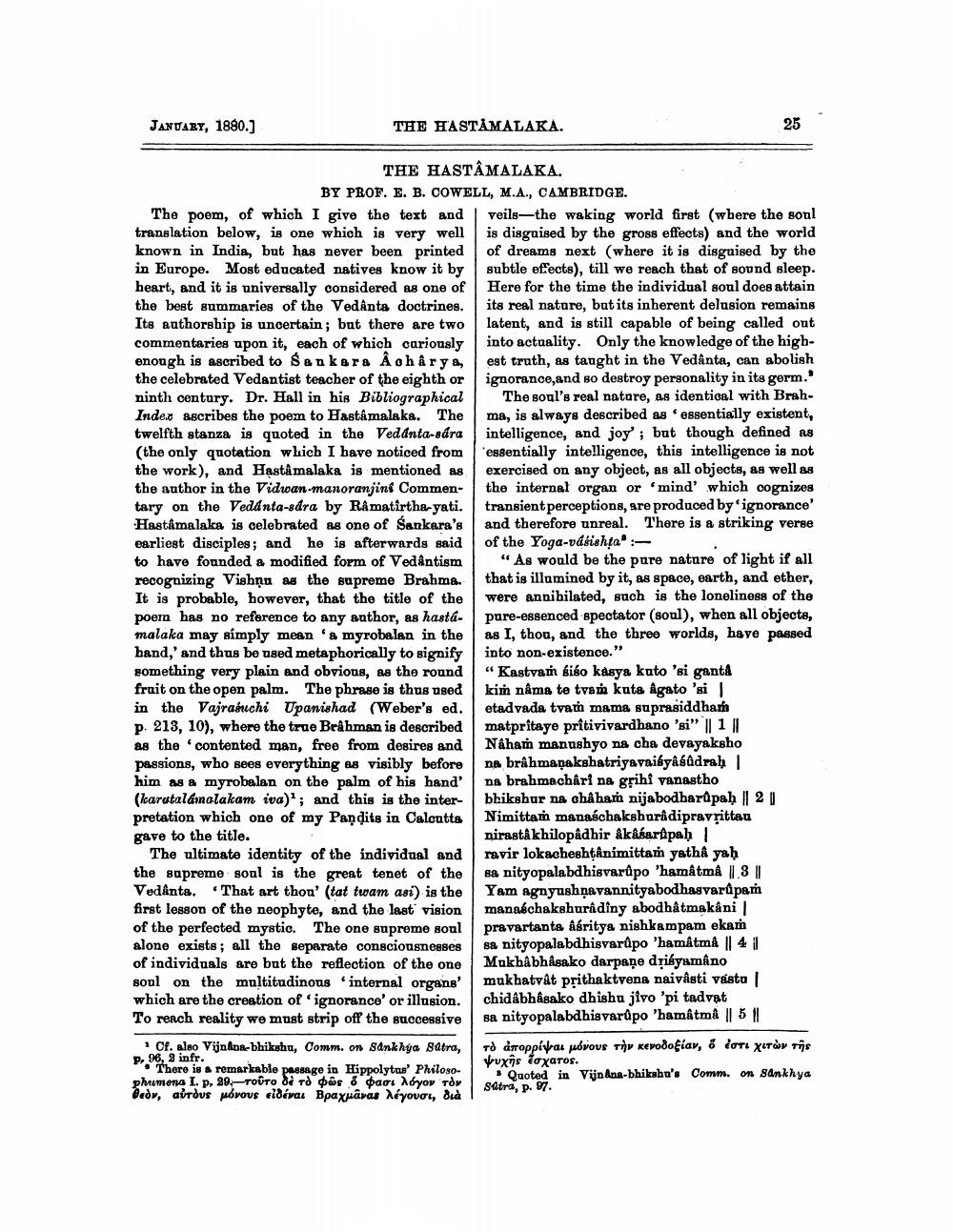________________
JANUARY, 1880.]
THE FASTÅMALAKA.
25
THE HASTÂMALAKA.
BY PROF. E. B. OOWELL, M.A., CAMBRIDGE. The poem, of which I give the text and veils—the waking world first (where the sonl translation below, is one which is very well is disguised by the gross effects) and the world known in India, but has never been printed of dreams next (where it is disguised by the in Europe. Most educated natives know it by subtle effects), till we reach that of sound sleep. heart, and it is universally considered as one of Here for the time the individual soul does attain the best summaries of the Vedanta doctrines. its real nature, but its inherent delusion remains Its authorship is uncertain; but there are two latent, and is still capable of being called out commentaries upon it, each of which cariously into actuality. Only the knowledge of the highenough is ascribed to Sankara Acharya, est truth, as taught in the Vedanta, can abolish the celebrated Vedantist teacher of the eighth or ignorance, and so destroy personality in its germ." ninth century. Dr. Hall in his Bibliographical The soul's real nature, as identical with BrahIndeo ascribes the poem to Hastamalaka. The ma, is always described as essentially existent, twelfth stanza is quoted in the Vedanta-sára intelligence, and joy; but though defined as (the only quotation which I have noticed from 'essentially intelligence, this intelligence is not the work), and Hastâ malaka is mentioned as exercised on any object, as all objects, as well as the author in the Vidwan-manoranjins Commen- the internal organ or 'mind' which cognizes tary on the Vedanta-sdra by Råmatirtha-yati. transient perceptions, are produced by'ignorance' Hastamalaka is celebrated as one of Sankara's and therefore unreal. There is a striking verse earliest disciples; and he is afterwards said of the Yoga-vdsishta :to have founded a modified form of Vedantism "As would be the pure nature of light if all recognizing Vishnu as the supreme Brahma. that is illumined by it, as space, earth, and ether, It is probable, however, that the title of the were annihilated, such is the loneliness of the poem has no reference to any author, as hasta pure-essenced spectator (soul), when all objecte, malaka may simply mean 'a myrobalan in the as I, thou, and the three worlds, have passed band,' and thus be used metaphorically to signify into non-existence." gomething very plain and obvious, as the round “Kastva siso kasya kuto 'si ganta fruit on the open palm. The phrase is thus used kim nama te tvan kuta âgato 'si in the Vajrabuchi Upanishad (Weber's ed. etadvada tvam mama suprasiddhar p. 213, 10), where the true Bråhman is described matpritaye pritivivardhano 'si" || 1 || as the contented man, free from desires and Náham manushyo na cha devayaksho passions, who sees everything as visibly before na brahmanakshatriyavaisyâsadrah him as a myrobalan on the palm of his hand' na brahmachari na grihi vanastho (karatalámalakam iva); and this is the inter- bhikshur na chåham nijabodharúpah | 2 pretation which one of my Pandits in Calcutta Nimittam manaśchakshuridipravrittau gave to the title.
nirastAkhilopâdhir ákåsartpah The ultimate identity of the individual and ravir lokacheshtAnimittam yathi yah the supreme soal is the great tenet of the Ba nityopalabdhisvarůpo 'hamåtmå 13 || Vedanta. That art thou' (tat twam asi) is the Yam agnyushṇavannityabodhagvarúpaí first lesson of the neophyte, and the last vision manabchakshurâdîny abodhâtmakani of the perfected mystic. The one supreme soul
pravartanta asritya nishkampam ekam alone exists; all the separate consciousnesses sa nityopalabdhisvarůpo 'hamåtma || 4 | of individuals are but the reflection of the one Makhâbhâsako darpaņe driøyamano sool on the multitudinous internal organs' mukhatvat prithaktvena naivasti vasta which are the creation of 'ignorance' or illusion. chidâbhâsako dhishu jivo 'pi tadvat To rench reality we must strip off the successive sa nityopalabdhisvarůpo 'hamâtm& |5 |
Of. also Vijna-bhikshu, Comm. on Sankhya Satra, το απορρίψαι μόνους την κενοδοξίαν, και εστι χιτών της P, 96, 2 infr. • There is a remarkable passage in Hippolytus' Philoso
ψυχής έσχατος. phumena I. p, 29.TOÛTO de to pôs 8 pagi oyoy Toy
Quoted in Vijnana-bhikshu's Comm. on Sankhya θεον, αυτους μόνους ειδέναι Βραχμάναι λέγουσι, διά!
satra, p. 97.




